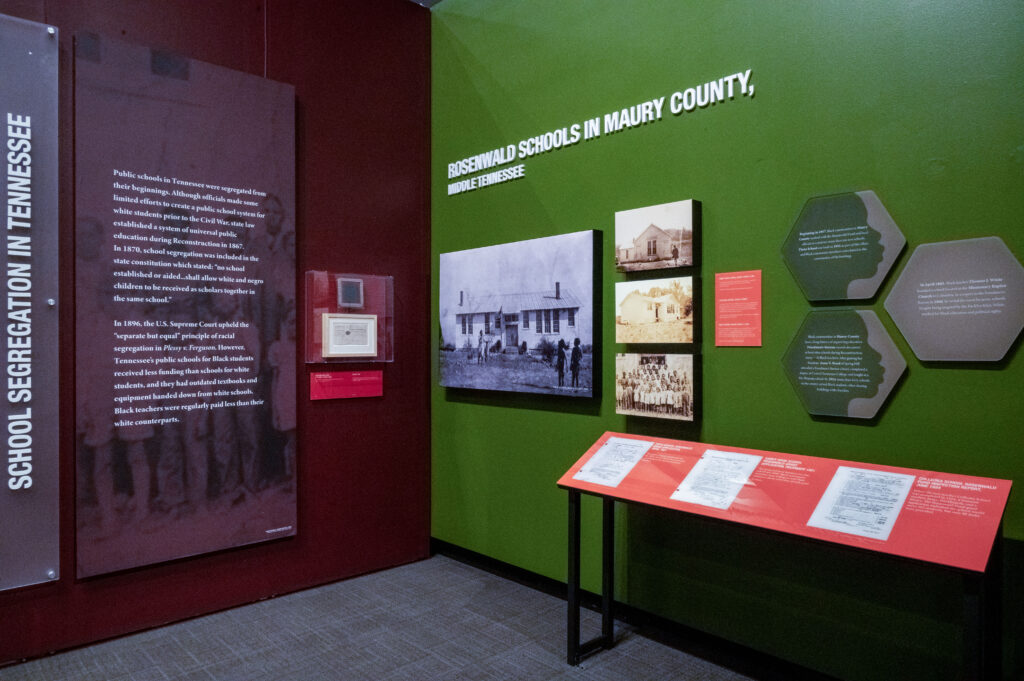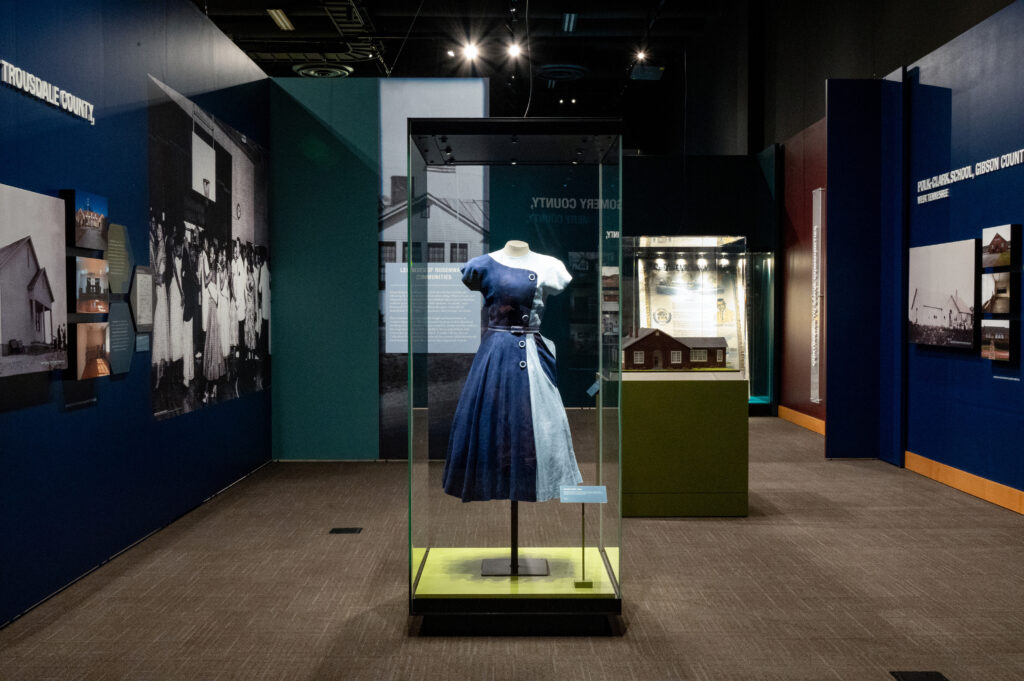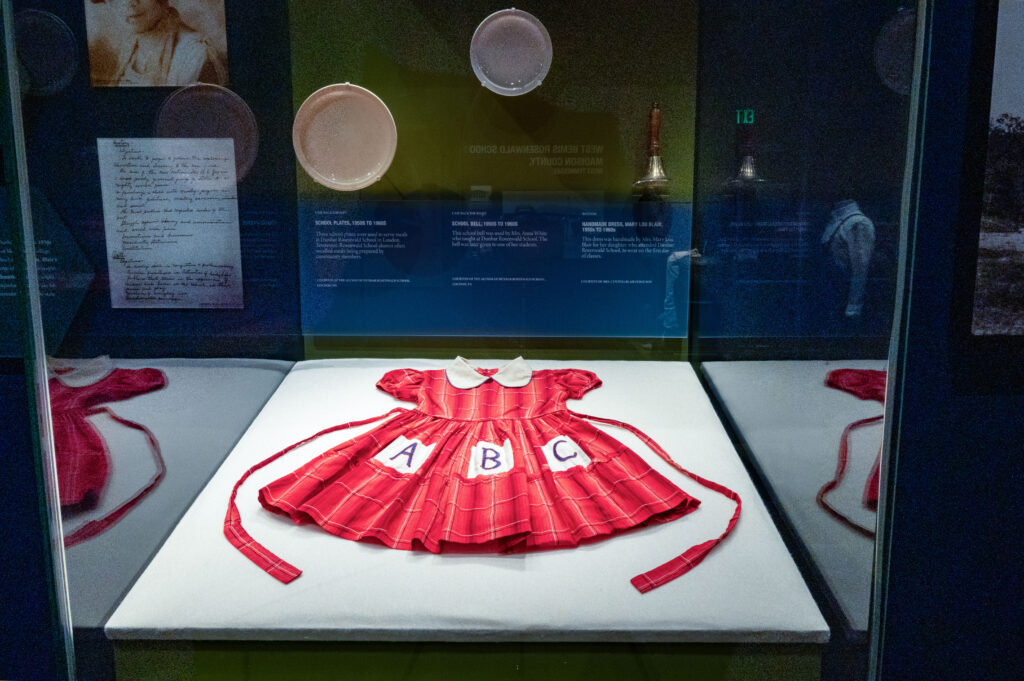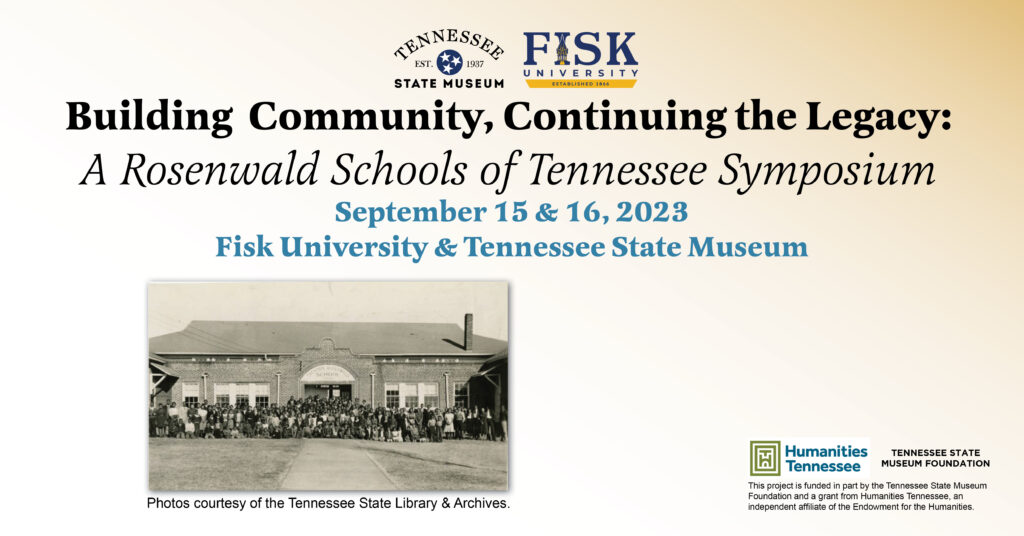Preserving Rosenwald Schools Legacies Through Traveling Exhibits
In the early twentieth century, Julius Rosenwald, the president of Sears, Roebuck, and Co., Booker T. Washington, the president of the Tuskegee Institute, and Black communities throughout 15 southern states partnered to build almost 5,000 schools for Black children. There were 354 of these institutions across Tennessee. Commonly known as Rosenwald Schools, these community anchors educated the generation of students who went on to lead the Civil Rights movement.
The story of these schools – and the work being done today to preserve their legacies – was the subject of the 2023 temporary exhibit Building a Bright Future: Black Communities and Rosenwald Schools in Tennessee at the Tennessee State Museum (TSM), created in partnership with Fisk University’s John Hope and Aurelia E. Franklin Library, which houses the Julius Rosenwald Fund Archives. The process of curating the exhibit ultimately led to a symposium, supported by a grant from Humanities Tennessee, and a traveling exhibit that will tour the state over the next several years.
Started with Traveling and Temporary Exhibitions
The 4,000 square foot temporary exhibition took over a year of research and development. According to Debbie Shaw, TSM Senior Curator of Archaeology, museum staff had long discussed curating an exhibit about Rosenwald Schools. However, the museum usually focuses on exhibits that showcase their collections and they do not hold many Rosenwald artifacts, which made gaining momentum for the exhibit challenging. When photographer Andrew Feiler contacted TSM about hosting A Better Life for their Children, an exhibit of Rosenwald School photographs, it gave the staff “a launching pad to do a community-based exhibit,” Shaw explained. The museum booked Feiler’s exhibit and then committed to opening Building a Bright Future the month after Feiler’s closed.
From the beginning, TSM and Fisk staff sought out public facing Rosenwald alumni groups to tell their own stories. They traveled to 16 Rosenwald schools across the state and spoke with alumni, descendants, and community members dedicated to keeping the legacies of these schools alive. The exhibit began in the Reconstruction period with an exploration of the history of education for Black Tennesseans prior to 1912. Other topics included student experiences in Rosenwald Schools and the legacies of Rosenwald School Communities. In determining how to structure the exhibit, TSM Curator of Social History Trenae’ Chatman explained, “we [museum curators] provided the context; they [community members] decided how to tell their story.”







Which Led to The Symposium
As the curators and librarians traveled the state, they realized there was a need to connect the Rosenwald alumni groups they were meeting to each other and to available resources. Shaw recalled that groups ranged from having a building about to fall apart to fully restored schools and everything in between. The partners decided the best way to bring these groups together was a jointly-hosted symposium. Humanities Tennessee awarded the group a grant to pay travel expenses for their community partners to travel to Nashville for two days of “exploring the history and legacy of the schools and the communities that built and preserved them” in September 2023. They invited two members from each partner organization and ultimately had 31 Rosenwald School alumni in addition to another 100 interested individuals at two days of discussions.
The symposium featured one day at Fisk University focusing on remarks from community partners and discussions about community curation and digitization as well as a presentation from Fisk about their online archives. The second day at TSM featured the statewide history of Rosenwald Schools, an introduction to statewide resources, and a keynote panel discussion of alumni experiences. The exhibit and symposium ultimately received Awards of Excellence from the Tennessee Association of Museums as well as the association’s Past Presidents Award, its highest honor given.

Evolved into the Rosenwald Schools Traveling Exhibits
By the time the exhibit opened at TSM, Shaw had already received numerous requests to have the exhibit travel. The museum ultimately decided to transform the large exhibition into a panel exhibit that would travel without artifacts. Shaw noted that staff made this decision, “because we wanted it to go into every Rosenwald space that wanted it,” without their partners having to worry about security or environmental controls. The fabric panels are sturdy, easy to set up, and able to be configured to fit a variety of spaces.
The response from museums and alumni groups was so large that TSM decided to print two copies of the exhibit. One set is reserved for Rosenwald alumni and Black history groups while the other is for museums across the state. The exhibit is free to host for a six-week period, which includes delivery and pick up by TSM’s Field Services. The exhibit panels tell the history of the schools into the present, and TSM is providing blank templates for hosts to add their local Rosenwald School stories.
Chatman noted that the Rosenwald community needs a lot of resources to preserve their history. Having the exhibit travel amplifies their story, which increases their chances of receiving support from their local communities. Her vision is that in ten years, the alumni’s stories are still being told and that there will be an established way for people to find these stories, learn more, and add to them.
Tennessee State Museum’s Future in Field Services
The traveling Rosenwald Schools exhibit presents an opportunity to get TSM into local communities through their new Field Services Department, which is managed by Shaw. Her vision for the future is to create a network of Tennessee museums of all sizes that are connected to the state museum’s resources. In ten years, she hopes to see more full-time people in her department actively offering expanded advice on exhibits, lighting, and artifact care. She’d also like to see a portion of staff dedicated to helping smaller museums because “they’re the life of the community. It’s the community museums that get to hold onto that community history. That doesn’t always make it to us [in Nashville]. Every city needs a museum.”



